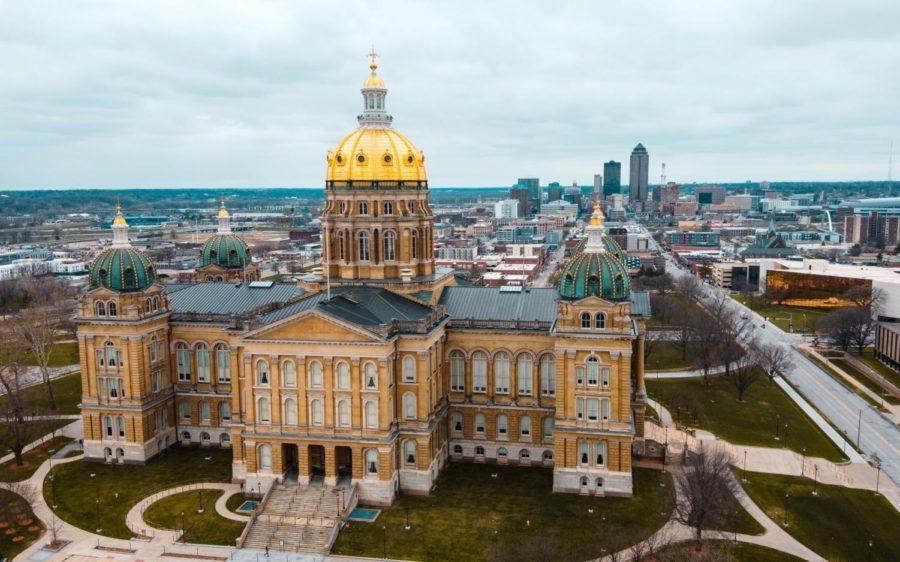Ames representatives give preview of 2022 as Iowa’s Legislature begins its new session
Courtesy of Austin Goode/Unsplash
The ISD Editorial Board explains the redistricting process in Iowa and how our legislature can continue to avoid gerrymandering.
January 30, 2022
After the start of a new legislative session, Ames’ representatives shared their plans for the new session as well as their thoughts on policies that have already been proposed.
Republicans outnumber Democrats 60-40 in the House and 22-18 in the Senate. Many Republicans, including Gov. Reynolds, face the midterm election this November.
Senator Herman Quirmbach (D-Ames) said that one of his key issues for the year would be funding for K-12 schools. He said Gov. Reynolds’ proposed increase of 2.5 percent in funding is not enough because inflation over the past year was around six to seven percent.
“The dollars don’t matter so much as what the dollars can buy,” said Quirmbach. “For example, if your boss gives you a thousand dollar raise that sounds great, but if you find out your cost of living has gone up three thousand dollars, you’re not a thousand dollars ahead, you’re two thousand dollars behind.“
Quirmbach said this year, Iowa will be behind inflation in funding for public schools. He also takes issue with Republicans taking credit for the budget surplus from last year.
“When you factor in university and community college funding shortfalls over the last five years, you add that to the K-12 you get about a $768 million shortfall,” said Quirmbach. “The surplus is $1.24 billion. In other words, 60 percent of the so-called surplus has been achieved by shortchanging our kids’ education.”
Rep. Beth Wessel-Kroeschel (D-45) also believes that public education is an important issue. Both she and Quirmbach said they disagree with Reynold’s proposed policy to award a scholarship to families that want to transfer to a private school.
“This is just another way of destroying public education in this state,” said Wessel-Kroeschel. “If you give money to private education, you’re taking money away from public education. From a state perspective we should be using tax dollars on public education and not on private education.”
She said her main focus this year would be improving access to childcare and the quality of that childcare. She said that often employers push for access to childcare but not quality.
Wessel-Kroeschel also stressed the importance of mental health care in Iowa and said the goal is to fund the original plans agreed upon in 2016 and 2017 that were never followed through on. She said that mental health is becoming less stigmatized, but there still needs to be more resources to address it, especially among young people.
“[Teenage suicide] is really considered an epidemic so we clearly have a lot of needs and it’s a high priority for a lot of Iowans,” said Wessel-Kroeschel.
Another issue both Quirmbach and Wessel-Kroeschel said they take seriously is Reynolds’ proposed tax plan. The plan would change Iowa’s current progressive income tax system to a flat 4 percent tax rate by 2026.
“I support a fair tax system; this flat tax is not fair,” said Wessel-Kroeschel. “The burden goes more on people who have less money because 4 percent is a much bigger burden for someone in a lower range than a higher range.”
Quirmbach also said he plans to reintroduce a bill he filed last year that he has since expanded on. The bill would give funding to police and sheriffs departments for two specific things: paying for body cameras and improving departments’ abilities to identify citizens with mental health issues and provide proper support.
“Independent objective video record of police citizen interaction really protects both sides,” Quirmbach said. “I’d also like to see more personnel to identify citizens with mental health needs who may interact with law enforcement to get the support they need before they commit crimes.”
Quirmbach said he hopes his bill will pass this year, although it was shot down by Republicans last year despite being something Quirmbach thinks they would support.
Although the two parties disagree on most issues, Wessel-Kroeschel said there might be some opportunity for bipartisanship with broadband and renewable energy.
“We did a big broadband bill last year and that was carried in a bipartisan fashion and typically when we work on renewable fuels we tend to agree in most areas,” said Wessel-Kroeschel.







